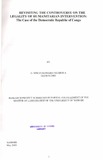| dc.description.abstract | According to Mahmood Mamdani, an International Rescue Committee Report
estimates that 3.3 million people have died over the past four and a half years of war
in the Democratic Republic of Congo. Yet no significant centre of power or opinion is
calling for a "humanitarian intervention" in Congo
In his special report on the event in Ituri, (January 2002 - December 2003)
presented to the Security Counsel on the 16th July 2004 the General Secretary Of the
United Nations Koffi Annan, reported that the situation of human rights in the Ituri
district, situated in the Oriental Province of the Democratic Republic of Congo is
today one of the most disastrous of the world after it has staid unknown. According to
the investigations done by the MONUC and other association of human rights
defenders between January 2002 and December 2003, some 8 000 civilians -
probably more, in fact - have been victims of murder or the blind use of force. It is
impossible for the moment to give an estimation of the number of women who have
been raped or put to sexual slavery. More than 600 000 civilians have been forced to
run away from their places, Thousands of children aged from 7 to 17 years old have
been unwillingly recruited by armed groups.
The RIPADHU has reported that since end of May the South Kivu is victim of
an unjustified war which has opposed the 10th Military Region to insurgents. This war
has left behind it a lot of damage. Systematic pillage, woman and children have been
raped, imprisonment in inhuman conditions, houses have been bunt, killing of people
One asks then why is it that any intervention is being setting up for the
Democratic Republic of Congo is it because what is going on has not reached the
level of becoming matter of international concern? The following question being what
then is that level? Can there be set in advance some criteria of intervention? The heart
of the matter is to try to find out if the humanitarian intervention is legal, if so what is
its legal basis, one may ask that if human rights are being reported all over the world
who then will intervene where in other world what is the level of human rights
violation which warranty the intervention, who has to intervene, or what are the
criteria of the intervention? The researcher will particularly focus on the situation of
the Democratic Republic of Congo and analyse whether the situation has or has not
reached the level required to the setting up of a humanitarian intervention. It is
ambitious to pretend to provide answers to the controversial question who has the
duty to intervene, when he shall do it, and how is he supposed to intervene though this
will be the focus of the study.
After an introductory chapter the researcher will analyse in a second chapter
the legality and the criteria of a humanitarian intervention, the third chapter will be
focused on the particular case of the Democratic Republic of Congo, in the last
chapter he will come up with some recommendations and conclude the study. | en |

